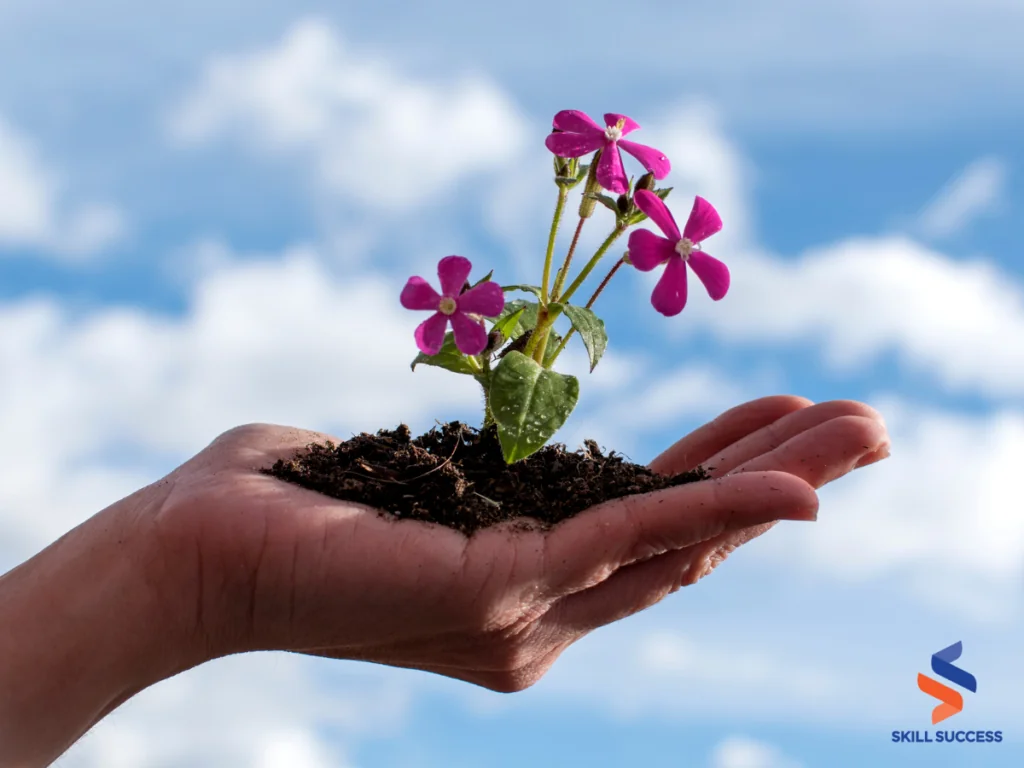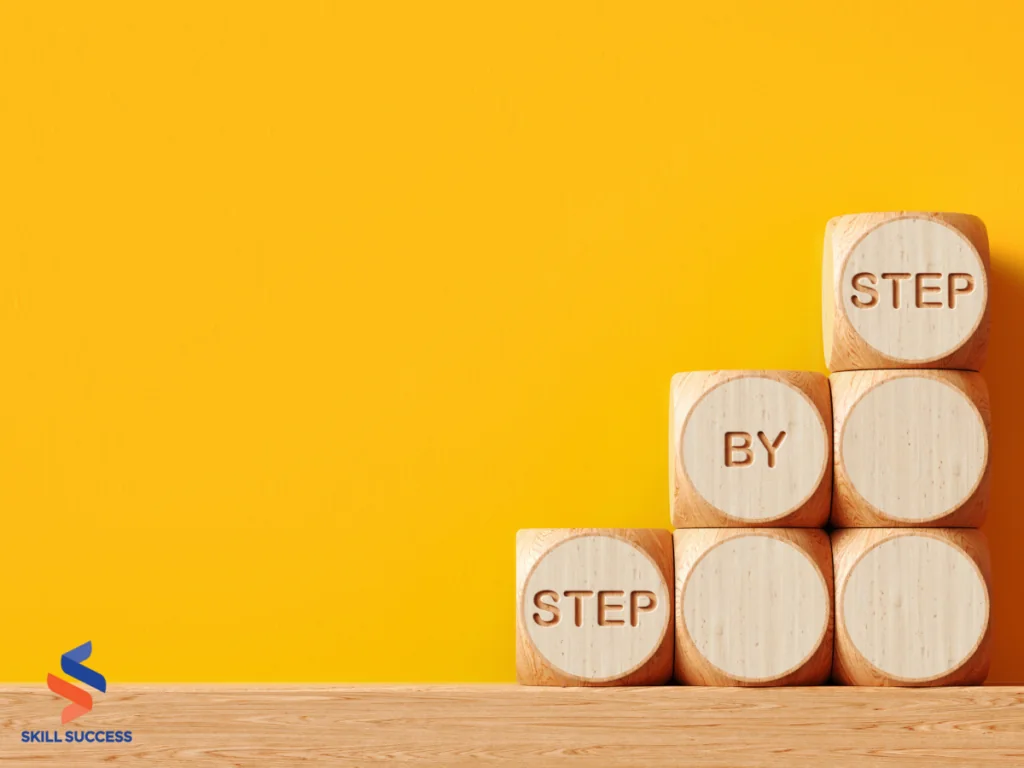
I've always believed there's room for improvement, and that belief has kept me learning new things for years. Whether it's cooking, organizing, or taking personal development courses, I'm always on the lookout for new knowledge.
But I get that today, it can be tough for many to focus on personal development, even if they want to. Some people might not know where to start, or they might be hesitant to try making changes.
If you are in that same boat, I've managed to collect some solid advice from experts on which personal development skills are worth focusing on. Additionally, I've learned how to tackle the common challenges that come with trying to improve yourself.

Key Personal Development Skills
In 2022, the market for personal growth reached $43.77 billion and is expected to grow by 5.5% each year until 2030. This shows how much people value improving themselves and their lives.
But which skills do you have to focus on?
1. Effective communication
This involves clearly expressing ideas and actively listening to others. It's crucial in all areas of life, from professional environments to personal relationships, enhancing understanding and collaboration.
Luke Taylor of Crime Story firmly believes that communication skills are a must skill all employees should consider. Here’s why:
“It shouldn't have taken a Detective to solve that, but after 14 years in criminal investigation, and now a teacher and communication specialist. I know how empowering it is to give voice to those who need it. It is a self development skill that underpins all else. Without it, you remain a newborn, unable to express yourself, inquire, think critically and solve problems. Communication is the "rock hard" soft skill.”
Remember, communication is not just about expressing your thoughts. In fact, effective communication relies on your ability to listen.
This is what Erman Küplü of Analyzify has to say.
“Mastering this skill involves not only articulating ideas clearly but also active listening. By understanding others' perspectives, one can navigate interpersonal relationships more successfully.”
2. Critical thinking
Critical thinking is the ability to analyze information objectively and make reasoned judgments. It helps in evaluating situations, solving problems, and making decisions based on logic rather than emotion.
3. Emotional intelligence
Emotional intelligence (EI) refers to the capacity to be aware of, control, and express one's emotions, and to handle interpersonal relationships judiciously and empathetically. High EI improves teamwork, leadership, and conflict resolution.
Here’s an article on how you can boost your emotional intelligence for business.
4. Problem-solving
This skill involves identifying issues, developing possible solutions, and implementing those solutions effectively. Strong problem-solving abilities are highly valued in any role, allowing for efficient and effective resolutions.
5. Time management
Time management is the ability to plan and control how someone spends the hours in a day to effectively accomplish their goals. It is essential for balancing work, leisure, and personal responsibilities.
6. Adaptability
Adaptability is the skill of being able to adjust to new conditions. In a fast-changing world, being adaptable allows you to respond effectively to changes and challenges.
7. Leadership
Leadership is the act of guiding and inspiring others towards a common goal. It involves managing teams, motivating individuals, and possessing a vision that others want to follow.
Kamil Bajolek of PRM.com understands that technical skills and leadership skills go hand in hand.
“I found that my leadership skills were as important as my technical knowledge. These skills can be driving for personal growth and the success of your company."
8. Creativity and innovation
Creativity is the ability to think outside the box and come up with new and original ideas. Innovation involves applying these ideas to solve problems or create value. Both are key drivers of growth and progress in any field.
Maria Kyprianou of OCBB shares her valuable personal experience.
“You need to grow as a person to make your company grow with you. In my position, creativity and analytical thinking are indispensable personal development skills. Creativity allows me to come up with innovative campaign ideas, like when I developed a unique social media strategy that increased engagement by 9%. I use a lot of creativity in content writing as well!”
9. Resilience
Resilience is the capacity to recover quickly from difficulties. It's about bouncing back from failures or setbacks and continuing to pursue goals despite challenges.
10. Self-motivation
Self-motivation is the drive to achieve goals without external encouragement. It's crucial for personal and professional development, leading to higher productivity and achievement.
11. Mindfulness and stress management
Mindfulness involves being fully present and engaged in the moment, which can significantly reduce stress levels. Effective stress management techniques are vital for maintaining mental and physical health.
Meanwhile, you can take a look at this insightful article on stress management.
12. Networking
Networking is the skill of building and maintaining professional relationships. It can lead to new opportunities, insights, and support systems in both personal and career development.
13. Financial literacy
Financial literacy is the understanding of how money works, including how to manage, invest, and save it. It's essential for making informed financial decisions and achieving financial stability.
14. Cultural competency
Cultural competency involves understanding and respecting differences in cultures. It's increasingly important in our globalized world for fostering inclusive environments and effective communication across diverse groups.
15. Goal setting
Goal setting is the process of identifying what you want to achieve and establishing measurable objectives and timeframes. It's a fundamental step in planning your personal and professional development journey.
Steve Gregory of Black Bull Performance Group has an interesting take on why you should know how to set goals and why you must identify your purpose.
A clear purpose will save you from wasting time, money and energy on something that will get you nowhere. Remember the Alice in Wonderland story when Alice asks "would you tell me, please, which way I ought to go from here?" "That depends a good deal on where you want to get to," said the Cat. "I don't much care where--" said Alice. "Then it doesn't matter which way you go," said the Cat. "-so long as I get SOMEWHERE," Alice added as an explanation. "Oh, you're sure to do that," said the Cat, "if you only walk long enough.
This story emphasizes the importance of knowing your destination to make your journey meaningful and efficient.
16. Neuro-Linguistic Programming (NLP)
Learning Neuro-Linguistic Programming (NLP) offers profound benefits in communication, personal growth, and professional development. It equips you with techniques to improve your ability to influence, persuade, and understand others, fostering better relationships and more effective conflict resolution.
Rik Schnabel of Brain Untrainer offers this interesting insight.
“After coaching and teaching in the personal development space for 22 years, the most important skill that one should possess is Neuro Linguistic Programming. In fact, Robert Kiyosaki said if he did his time again and could only do one course - it would be NLP. The large majority of people have no idea how to manage the most important supercomputer available to them - their brain. Without this knowledge, you won't know what beliefs are tripping you up and what is getting in your way.|”
Gabriella O’Mullan’s words of Aaron Kennedy Marketing rings absolutely true.
“Skills are important, of course. But I also think you need to have a proper mindset as well - be ready to make huge changes both in your career and life.”
I also encourage you to read this article on areas of improvement you need to develop.

Resources for Personal Development
Personal development is a continuous journey, and there are numerous resources available to help you grow and improve in various areas of your life.
Here's a rundown of some key types of resources you might find helpful:
Books
- Self-help and personal development books: These books offer insights, strategies, and techniques to improve aspects of your personal and professional life, including productivity, mental health, and interpersonal skills.
- Biographies and autobiographies: Reading about the lives and experiences of successful people can provide inspiration and valuable lessons on resilience, leadership, and perseverance.
Online courses
- MOOCs (Massive Open Online Courses): Platforms like Skill Success offer courses on a wide range of topics, from emotional intelligence and critical thinking to time management and leadership skills.
- Webinars and workshops: Many experts and organizations host online webinars and workshops, providing opportunities to learn directly from professionals and interact with others interested in personal development.
Podcasts and audiobooks
- Personal development podcasts: There are numerous podcasts that focus on self-improvement, offering tips, advice, and insights on various topics, including mindfulness, productivity, and career development.
- Audiobooks: For those who prefer listening to reading, audiobooks can be a convenient way to absorb personal development content during commutes or while multitasking.
Apps
- Meditation and mindfulness apps: Apps like Headspace and Calm offer guided meditations, sleep stories, and mindfulness exercises to help reduce stress and improve mental well-being.
- Habit tracking apps: Tools like Habitica and Streaks can help you build and maintain positive habits through gamification and tracking mechanisms.
Professional help
- Counseling and coaching: Professional counselors or life coaches can provide personalized guidance and strategies to help you achieve your personal development goals.
- Mentorship: Finding a mentor in your field or area of interest can offer valuable insights, advice, and encouragement.
Networking and community groups
- Professional networks: Joining professional networks or industry associations can provide opportunities for networking, mentorship, and continuing education.
- Local meetups and clubs: Participating in local meetups, clubs, or interest groups can be a great way to meet like-minded individuals and expand your social and professional network.
Social media and forums
- Online communities: Platforms like Reddit, LinkedIn, and specialized forums host communities where individuals share advice, experiences, and resources on personal development.
- Inspirational social media accounts: Following thought leaders and influencers in the personal development space can provide daily motivation and tips.

Tips for Balancing Career Ambitions and Personal Well-Being
- Set clear boundaries
- Prioritize your health
- Practice time management
- Pursue meaningful goals
- Cultivate a supportive network
- Embrace flexibility and adaptability
- Take time for yourself
- Stay proactive about stress management
- Continuous learning and growth
- Celebrate achievements
Ahamed Sha of New Launcher shares this practical and highly effective tip for achieving your personal development goals.
“Consistency is vital, so strive for small, regular improvements rather than overwhelming yourself. Integrating personal development into your routine allows you to navigate a busy lifestyle while fostering valuable skills for long-term success.”
Additionally, Guy Sharp of Andorra Guides offers this strategy.
“Finding the way to integrate personal development into a busy schedule requires consideration, flexibility and balance. If life is already hectic, small changes are perhaps the best way to add time for personal development into your day. Swap out your time spent scrolling Instagram for 10 minutes of reading, listen to a podcast while preparing your dinner. These small changes can help you make time for personal growth, while not putting you under the strain of overloading an already busy schedule.”

Frequently Asked Questions
How can setting boundaries improve work-life balance?
Setting boundaries is crucial for improving work-life balance because it helps delineate clear lines between professional responsibilities and personal time.
This separation ensures that work does not encroach upon time reserved for rest, hobbies, family, and friends. By establishing boundaries, individuals can reduce work-related stress during off-hours, enhance focus and productivity during work hours, and ensure sufficient time is allocated for relaxation and personal activities.
Boundaries also help manage expectations with colleagues and supervisors, making it easier to disconnect from work without guilt or fear of negative repercussions. This balance is essential for maintaining mental health, preventing burnout, and sustaining long-term career satisfaction and personal happiness.
How does physical health impact professional success and personal well-being?
Physical health has a profound impact on both professional success and personal well-being. Good physical health boosts energy levels, enhances brain function, and improves mood, directly contributing to higher productivity, creativity, and resilience in the workplace. It enables individuals to handle the demands of their jobs more effectively and with less stress.
On the personal side, maintaining physical health through regular exercise, a balanced diet, and adequate sleep can reduce the risk of chronic diseases, improve mental health, and enhance quality of life.
When individuals feel physically well, they are more capable of engaging fully in both work and leisure activities, leading to a more fulfilling and balanced life.
What strategies can help integrate mindfulness into a busy professional life?
Integrating mindfulness into a busy professional life can be achieved through several practical strategies:
- Brief meditation sessions: Starting or ending the day with a short meditation can help center thoughts and reduce stress. Even a few minutes can make a difference.
- Mindful breathing breaks: Taking short breaks throughout the day to focus solely on breathing can help reset the mind and reduce anxiety.
- Mindful walking: Using short walks, even if just around the office, to practice mindfulness by paying attention to the physical sensations of walking and the environment.
- Mindful eating: Taking the time to eat without distractions, focusing on the taste, texture, and experience of food, can turn meals into a mindfulness practice.
- Setting reminders: Using reminders to take moments throughout the day to check in with oneself and practice mindfulness.
Can a career change improve work-life balance?
A career change can indeed improve work-life balance, especially if the new career better aligns with an individual's personal values, interests, and preferred lifestyle.
Switching to a role with more flexible hours, less stress, or a shorter commute can provide more time and energy for personal activities and family, enhancing overall well-being.
Additionally, moving to a career that one is passionate about can reduce the feeling of work being a chore, thereby diminishing stress and improving life satisfaction. However, it's important to carefully consider and plan a career change, ensuring that the new path offers the desired balance.
How can effective time management contribute to a better work-life balance?
Effective time management is a key contributor to achieving a better work-life balance. It involves organizing and prioritizing tasks to ensure that work responsibilities are completed efficiently within designated work hours, leaving ample time for personal life activities.
By setting realistic goals, breaking down tasks into manageable steps, and using tools like calendars and to-do lists, individuals can avoid procrastination and minimize time wasted on non-essential activities.
Effective time management also includes scheduling breaks and personal time to prevent burnout and maintain productivity. When work is contained within its allotted time, it reduces the likelihood of work encroaching on personal time, thereby enhancing overall life satisfaction and well-being.
Matt Little of Festoon House emphasizes the importance of allotting time for personal development.
“First and foremost, I block out time in my calendar for personal growth. Whether it's reading books, going to seminars, or enrolling in online courses, I always make time for it. I view it as a necessary component of my business, much like any other duty.”

Key Takeaways
I’ve uncovered the best personal development skills, the importance of setting clear boundaries, prioritizing physical health, integrating mindfulness into our daily routines, considering a career change for better alignment with personal values, and employing effective time management strategies. The techniques I shared are not just theoretical but practical steps that can lead to a more fulfilling, balanced life where professional success and personal happiness coexist harmoniously.
Start small if you need to; even minor adjustments can lead to significant improvements in your work-life balance.
Achieve a healthier work-life balance and enhance your personal development with Skill Success All Access Pass. This platform offers a wide range of courses and resources designed to help you develop new skills, enhance existing ones, and gain valuable insights into managing your time, health, and professional or personal growth more effectively.

